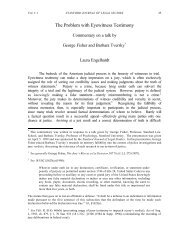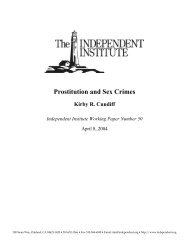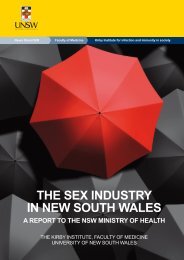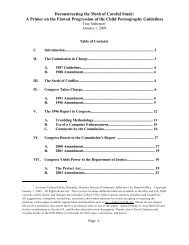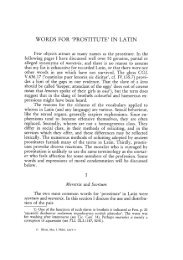Beyond Gender: An Examination of Exploitation in Sex ... - Sexworker
Beyond Gender: An Examination of Exploitation in Sex ... - Sexworker
Beyond Gender: An Examination of Exploitation in Sex ... - Sexworker
You also want an ePaper? Increase the reach of your titles
YUMPU automatically turns print PDFs into web optimized ePapers that Google loves.
SUMMARY REPORT<br />
BEYOND GENDER: AN EXAMINATION OF EXPLOITATION IN SEX WORK.<br />
Please note that as survey respondents could skip any questions they wished and they could also<br />
tick as many boxes as were relevant to them, percentages will not always total 100. In most cases I<br />
will provide the percentage followed by the number <strong>of</strong> respondents <strong>in</strong> brackets (as n=).<br />
Geographic Location<br />
54.3% (n=239) <strong>of</strong> the survey respondents were resident <strong>in</strong> the UK. Respondents <strong>in</strong> the US, Canada,<br />
Australia, Western Europe and New Zealand made up a further 42.5% (n=187). Only around 3.2%<br />
(n=14) came from outside <strong>of</strong> this group <strong>of</strong> countries.<br />
<strong>Gender</strong><br />
Of the 483 survey responses, 61.8% (n=298) <strong>of</strong> respondents were female, 32.2% (n=155) were<br />
male, and 4.6% (n=22) were transwomen. One respondent reported as a transman and 6<br />
respondents reported as „other‟. Of this 6, 2 responses were from couples who escorted together<br />
and answered jo<strong>in</strong>tly, the other 4 were genetic males who were either transvestites or were <strong>in</strong> the<br />
process <strong>of</strong> gender transition. For the purpose <strong>of</strong> brevity however, throughout the rema<strong>in</strong>der <strong>of</strong> this<br />
report, where gendered comparisons are made, I will refer only to the 3 gender groups: male,<br />
female and transgender.<br />
Figure 1: <strong>Sex</strong>ual orientation by percentage<br />
Indication <strong>of</strong> reported sexual orientation is shown above <strong>in</strong> figure 1. While most respondents<br />
<strong>in</strong>dicated one <strong>of</strong> the three options, 2.9% (n=14) ticked „other‟ <strong>of</strong>fer<strong>in</strong>g explanations <strong>in</strong> the text box<br />
such as „gay for pay‟, “bi-curious”, “ma<strong>in</strong>ly straight”, and “work = bi / personal = straight”. This<br />
latter term was only specified by 1 participant. However, <strong>in</strong> retrospect, it was probably a more<br />
accurate description <strong>of</strong> other female respondents, who, hav<strong>in</strong>g reported as bisexual, later clarified<br />
<strong>in</strong> their <strong>in</strong>terview that this was only an identity that they related to with<strong>in</strong> the context <strong>of</strong> sex-work.<br />
Respondents were also asked about the gender <strong>of</strong> their clients. Of the 155 male respondents, 80.3%<br />
(n=123) serviced all or ma<strong>in</strong>ly male clients. Of the 32 rema<strong>in</strong><strong>in</strong>g men, 27 serviced only or ma<strong>in</strong>ly<br />
female clients with 5 report<strong>in</strong>g that they either services couples or an otherwise equal numbers <strong>of</strong><br />
male and female clients. With regard to transgendered respondents, 96% serviced all or ma<strong>in</strong>ly<br />
male clients. Of the 298 female respondents, over 96% (n=285) serviced either all male or ma<strong>in</strong>ly<br />
male clients. Of those rema<strong>in</strong><strong>in</strong>g women (13 <strong>in</strong> total), 6 serviced only female clients and 3 serviced<br />
ma<strong>in</strong>ly female clients. The other four, who all reported as lesbian or bisexual, chose not to<br />
comment.<br />
Page 1 <strong>of</strong> 11
Age and Length <strong>of</strong> Time <strong>in</strong> <strong>Sex</strong> Work<br />
The ages reported by participants revealed that the men were on average younger than the women,<br />
and the transgendered participants were on average older, with no transgendered participants under<br />
18 and only 1 under 25. Only 1 woman and 2 men were under 18. The mode for women was late<br />
30s whereas for men it was early 20s. A summary <strong>of</strong> the ages <strong>of</strong> participants is shown below <strong>in</strong><br />
Figure 2.<br />
Age Female Male Transwomen<br />
< 18 0.3 1.4 0.0<br />
18-25 14.8 23.8 4.5<br />
26-30 21.6 21.0 22.7<br />
31-35 19.9 20.3 31.8<br />
36-40 24.4 14.7 13.6<br />
41+ 18.9 18.9 27.3<br />
As can be seen <strong>in</strong> Figure 2., almost a fifth <strong>of</strong> both male and female participants, and almost a third<br />
<strong>of</strong> transwomen, were over 41 years <strong>of</strong> age. Closely related to age at the time <strong>of</strong> survey is the length<br />
<strong>of</strong> time that respondents had, at the po<strong>in</strong>t <strong>of</strong> survey completion, worked <strong>in</strong> the sex <strong>in</strong>dustry.. The<br />
category most frequently <strong>in</strong>dicated by both men and women was 3-5 years. More men,<br />
proportionately, had worked <strong>in</strong> the sex <strong>in</strong>dustry for over 21 years.<br />
Income and Education<br />
Respondents were asked about additional sources <strong>of</strong> <strong>in</strong>come and here, 69.6 % (n=206) <strong>of</strong> women<br />
reported that escort work was their ma<strong>in</strong> source <strong>of</strong> <strong>in</strong>come. This was similar for transgendered<br />
participants at 63.6% (n=14), and for men the figure drops to 43.8% (n=67). This re<strong>in</strong>forces the<br />
notion that escort work is less <strong>of</strong>ten a full time role for men, albeit that it is still the sole <strong>in</strong>come for<br />
almost half <strong>of</strong> the male respondents. Second, <strong>in</strong> terms <strong>of</strong> educational qualifications, male<br />
respondents rated slightly higher levels <strong>of</strong> academic qualifications. For example, 35.3 % (54) <strong>of</strong><br />
men held bachelor‟s degrees, whereas for women, this was 32.9% (n=98). Overall, more than a<br />
third <strong>of</strong> respondents were degree-educated, with over 18% (n=88) hold<strong>in</strong>g post graduate<br />
qualifications. Conversely, overall, only 6.5% (n=31) reported that they had no formal educational<br />
qualifications.<br />
Interviews<br />
Figure 2: Age <strong>in</strong> percentage at time <strong>of</strong> survey<br />
Respondents putt<strong>in</strong>g themselves forward as prospective <strong>in</strong>terviewees were asked to <strong>in</strong>dicate their<br />
preferred method <strong>of</strong> <strong>in</strong>terview, such as face-to-face or onl<strong>in</strong>e. Onl<strong>in</strong>e <strong>in</strong>terviews were carried out<br />
us<strong>in</strong>g either <strong>in</strong>stant messag<strong>in</strong>g or via email. A second group <strong>of</strong> <strong>in</strong>terviews were conducted by<br />
telephone, with or without the use <strong>of</strong> webcams. All other <strong>in</strong>terviews were conducted <strong>in</strong> person.<br />
Figure 3 below shows a summary <strong>of</strong> those <strong>in</strong>terviews broken down by methods and gender.<br />
Female Male Transwomen Total<br />
Face-to-<br />
Face 36 10 5 51<br />
Telephone 6 4 2 12<br />
Onl<strong>in</strong>e 28 15 2 45<br />
Total 70 29 9 108<br />
Figure 3: Number <strong>of</strong> <strong>in</strong>terviews by methods and gender<br />
Page 2 <strong>of</strong> 11
As can be seen <strong>in</strong> the above table, overall, men had a greater tendency to choose onl<strong>in</strong>e methods,<br />
whereas women preferred <strong>in</strong>-person <strong>in</strong>terviews, but there was quite a mix, as well as an assortment<br />
<strong>of</strong> reasons why that method was chosen.<br />
<strong>Gender</strong> and Motivation<br />
In terms <strong>of</strong> f<strong>in</strong>ancial motivation, survey respondents were asked to <strong>in</strong>dicate what escort work meant<br />
to them f<strong>in</strong>ancially. The results from this question are summarised <strong>in</strong> figure 4 below.<br />
Figure 4: The f<strong>in</strong>ancial mean<strong>in</strong>g <strong>of</strong> escort work<br />
As this shows, overall, almost half <strong>in</strong>dicated that escort work provided a more comfortable<br />
lifestyle, and this is also the option most selected by each gender group. The second-most<br />
<strong>in</strong>dicated, for both men and women, was a „more luxurious lifestyle‟ (except for transwomen, for<br />
whom the next most populous answer for them was that it provided more basic necessities). The<br />
option selected least by men and women was „not liv<strong>in</strong>g <strong>in</strong> poverty‟. Because terms like basic,<br />
comfort, and luxury are open to <strong>in</strong>terpretation, almost a third <strong>of</strong> the women, and some men,<br />
clarified their answers by cit<strong>in</strong>g the particular expenses that escort work had funded, such as<br />
holidays, pay<strong>in</strong>g for private school<strong>in</strong>g for children etc.<br />
One po<strong>in</strong>t <strong>of</strong> note here is that proportionally, more transgendered participants reported that escort<br />
work had been a response to poverty, and for over half, escort work provided a basic rather than<br />
extravagant lifestyle. Of the 6 who <strong>in</strong>dicated that escort work meant „not liv<strong>in</strong>g <strong>in</strong> poverty‟, 3 cited<br />
the particular economic issues for transwomen, such as the medical costs <strong>of</strong> sex reassignment<br />
surgery, and 4 reported hav<strong>in</strong>g experienced discrim<strong>in</strong>ation <strong>in</strong> the workplace. However, this still<br />
represents only around a third <strong>of</strong> transgendered participants overall.<br />
Respondents were also asked: “How did you first become <strong>in</strong>volved <strong>in</strong> escort work?” This was<br />
answered by 331 respondents <strong>in</strong> total. Overall, from the survey and <strong>in</strong>terview data, a multitude <strong>of</strong><br />
reasons emerged <strong>in</strong> response to the question <strong>of</strong> how men and women became <strong>in</strong>volved <strong>in</strong> sex work.<br />
In terms <strong>of</strong> economic motivation, <strong>of</strong> the 108 <strong>in</strong>terviewees, 57% (n=62) cited money as at least part<br />
<strong>of</strong> their explanation. This differed little by gender. It is also worth not<strong>in</strong>g that 38% (n=178) <strong>of</strong><br />
respondents reported that they had used escort work to fund their education.<br />
As well as th<strong>in</strong>k<strong>in</strong>g about <strong>in</strong>itial motivation for recruitment <strong>in</strong>to the sex <strong>in</strong>dustry, the survey also<br />
asked respondents what they liked about escort work. The responses to the selections <strong>in</strong>dicated by<br />
respondents, comparable by gender, are shown below as figure 5.<br />
Page 3 <strong>of</strong> 11
Female Male Transgendered<br />
The money 93.4% 83.0% 86.4%<br />
The lifestyle 46.0% 38.5% 40.9%<br />
Meet<strong>in</strong>g people 67.6% 66.7% 59.1%<br />
The sex 49.8% 74.8% 59.1%<br />
Flexibility <strong>of</strong> work<strong>in</strong>g hours 75.3% 51.9% 50.0%<br />
Be<strong>in</strong>g part <strong>of</strong> the escort<br />
community 27.5% 17.8% 0.0%<br />
The <strong>in</strong>dependence 72.5% 46.7% 4.5%<br />
Figure 5: Which <strong>of</strong> the follow<strong>in</strong>g do you like about escort work?<br />
There were several differences <strong>in</strong> terms <strong>of</strong> how men and women answered this question. For<br />
example, one <strong>of</strong> the most commonly reported factors for female participants was that flexibility and<br />
<strong>in</strong>dependence were important to them. As can be seem from the graph, over three quarters <strong>of</strong> the<br />
female participants rated flexible work<strong>in</strong>g hours (75.3% n=217) as someth<strong>in</strong>g that they like about<br />
the escort role, whereas for men, this dropped to just over half (51.9% n=70). This contrast is<br />
similarly reflected <strong>in</strong> the number who <strong>in</strong>dicated that it was the „<strong>in</strong>dependence‟ that they liked. This<br />
is probably not surpris<strong>in</strong>g given the demands <strong>of</strong> childcare that <strong>of</strong>ten fall upon women rather than<br />
men. In some cases the <strong>in</strong>dication was that fewer work<strong>in</strong>g hours meant more time to dedicate to<br />
parenthood, <strong>in</strong>clud<strong>in</strong>g attend<strong>in</strong>g school meet<strong>in</strong>gs or be<strong>in</strong>g home out <strong>of</strong> school hours. The other<br />
benefit <strong>of</strong> escort work mentioned by many participants with children was that because earn<strong>in</strong>gs<br />
from sex-work tended to be higher than they could otherwise earn, they were also able to afford<br />
family holidays or f<strong>in</strong>ance a further/higher education for older children.<br />
However, it is also important to highlight that an appreciation <strong>of</strong> flexible work<strong>in</strong>g hours and<br />
<strong>in</strong>dependence were factors that were valuable to women generally, not only mothers. The benefits<br />
<strong>of</strong> greater <strong>in</strong>dependence and flexible work<strong>in</strong>g hours were not just about the demands <strong>of</strong> parent<strong>in</strong>g -<br />
they were <strong>of</strong>ten about time provided for other, non parent<strong>in</strong>g-related pursuits. These <strong>in</strong>cluded other<br />
bus<strong>in</strong>ess <strong>in</strong>terests, study<strong>in</strong>g, and artistic or sport<strong>in</strong>g pastimes. Although some men similarly valued<br />
their personal time <strong>in</strong> this way, it was female participants who mentioned freedom and<br />
<strong>in</strong>dependence most frequently.<br />
Plans to stop escort work<br />
In terms <strong>of</strong> participants‟ longer term plans, respondents were asked: „How much longer do you plan<br />
to do escort work for?‟ The options <strong>of</strong>fered range from less than 3 months to „I have no plans to<br />
stop escort work‟. For women, „I have no plans to stop escort work‟ was jo<strong>in</strong>t first choice <strong>of</strong> answer<br />
along with „one-five more years (both were <strong>in</strong>dicated equally by 35.3% (n=101). In contrast, only<br />
3.2% (n=9) <strong>in</strong>dicated that they planned to stop <strong>in</strong> less than three months.<br />
For males <strong>in</strong> contrast, the top answer was „one-five more years‟ at 43.4% (n=59), followed by „I<br />
have no plans to stop escort work at 35.3 % (n48). Only 4.4% (n=6) <strong>of</strong> male participants <strong>in</strong>dicated<br />
that they planned to stop <strong>in</strong> under three months. The answers for trans women was similar to that<br />
<strong>of</strong> the male participants at 40.9% (n=9) <strong>in</strong>dicat<strong>in</strong>g that they planned to stop <strong>in</strong> between one and five<br />
years time, while no transwomen <strong>in</strong>dicated that they had plans to stop <strong>in</strong> under three months. This<br />
suggests that few participants had any plans to cease sex-work <strong>in</strong> the near future if at all.<br />
Client relationships<br />
Respondents were asked to choose, from 3 statements, how power is played out <strong>in</strong> commercial sex<br />
transactions. The results are provided below as figure 6 below.<br />
Page 4 <strong>of</strong> 11
Pay<strong>in</strong>g for sex puts the client <strong>in</strong> a<br />
position <strong>of</strong> power over the escort<br />
Pay<strong>in</strong>g for sex puts the client <strong>in</strong> a<br />
vulnerable position <strong>in</strong> relation to the<br />
escort<br />
Commercial sexual transactions are<br />
relationships <strong>of</strong> equality<br />
Females Males Transgendered<br />
Page 5 <strong>of</strong> 11<br />
6.8% 15.8% 31.8%<br />
26.2% 33.8% 13.6%<br />
54.5% 44.4% 40.9%<br />
None <strong>of</strong> the above 15.1% 12.8% 22.7%<br />
Figure 6: Which <strong>of</strong> the follow<strong>in</strong>g statements would you say best expla<strong>in</strong>s how power is<br />
played out <strong>in</strong> commercial sexual transactions?<br />
The responses to this question show that regardless <strong>of</strong> gender, the majority <strong>of</strong> respondents perceive<br />
commercial sex as a relationship <strong>of</strong> equality; as escorts, they neither have power over, nor are<br />
submissive to, their clients. Of those that <strong>in</strong>dicated otherwise, the next most commonly-<strong>in</strong>dicated<br />
answer was that pay<strong>in</strong>g for sex put the client <strong>in</strong> a vulnerable position <strong>in</strong> relation to the escort. Only<br />
a small proportion <strong>of</strong> respondents, particularly female respondents, felt that power resided with the<br />
pay<strong>in</strong>g client. For men it was a little more varied, with more, proportionally, <strong>in</strong>dicat<strong>in</strong>g that there<br />
was a power imbalance one way or another. Although otherwise similar, for transgendered<br />
respondents, the proportion who felt that the client was <strong>in</strong> a position <strong>of</strong> power was somewhat<br />
higher.<br />
Accept<strong>in</strong>g that notions <strong>of</strong> power and control are <strong>in</strong>terrelated, <strong>in</strong>s<strong>of</strong>ar as a lack <strong>of</strong> power would<br />
suggest a related reduction <strong>in</strong> the ability to demonstrate control, a second question that feeds <strong>in</strong> to<br />
the theme <strong>of</strong> power relations was a question about who normally took overall control <strong>of</strong> the escort<br />
encounter. The results to this are shown below as figure 7.<br />
Females Males Transgendered<br />
You always do 54.6% 24.6% 27.3%<br />
You usually do 24.1% 26.1% 22.7%<br />
Your client does 0.7% 8.2% 4.5%<br />
It varies greatly 22.3% 45.5% 54.5%<br />
Figure 7: In your escort <strong>in</strong>teractions, who normally takes overall control <strong>of</strong> the encounter?<br />
As figure 13 shows, while over half <strong>of</strong> the women reported that they always took control <strong>of</strong><br />
meet<strong>in</strong>gs with clients, men were far less likely to do so. Of the 281 female respondents who<br />
answered this question, only 2 women said that their client took overall control. Of the 79% <strong>of</strong><br />
women (n=222) who reported feel<strong>in</strong>g either always or usually <strong>in</strong> control, many said they controlled<br />
everyth<strong>in</strong>g both prior to and dur<strong>in</strong>g the meet<strong>in</strong>g, whether subtly or overtly. In contrast, both male<br />
and transgendered participants more frequently reported that control varied greatly.<br />
Threaten<strong>in</strong>g behaviour<br />
Respondents were asked: „Have you ever felt physically threatened <strong>in</strong> any way as a result <strong>of</strong> your<br />
work?‟ In response to this, 25% <strong>of</strong> women and 18.7% <strong>of</strong> men said that they had, at some po<strong>in</strong>t, felt<br />
physically threatened. For transsexual women this <strong>in</strong>creased to 45.5%.<br />
Respondents were also asked about other types <strong>of</strong> threat (i.e. non-physical). 30% <strong>of</strong> women and<br />
23% <strong>of</strong> men <strong>in</strong>dicated feel<strong>in</strong>g threatened, and aga<strong>in</strong>, for transsexual participants, this was
substantially higher, with half <strong>of</strong> all transgendered participants report<strong>in</strong>g hav<strong>in</strong>g felt threatened. It<br />
was clear from the comments provided <strong>in</strong> response to this question that the type <strong>of</strong> threat be<strong>in</strong>g<br />
reported, <strong>in</strong> almost all cases, was the threat <strong>of</strong> be<strong>in</strong>g publicly exposed as a sex-worker.<br />
Respect<br />
Two survey questions addressed the topic <strong>of</strong> respect: the first asked: „Do you feel that, <strong>in</strong> the ma<strong>in</strong>,<br />
your clients treat you respectfully? The results are shown below as figure 8.<br />
Figure 8: Do you feel that, <strong>in</strong> the ma<strong>in</strong>, your clients treat you respectfully?<br />
As figure 8 shows, the overwhelm<strong>in</strong>g answer to this was „yes‟, male and female escorts did feel<br />
that they were treated respectfully. Only 15 respondents, said „no‟ to this question: 3 women, 1<br />
man and 11 transsexual women. Transgendered respondents are over-represented here, and several<br />
transwomen added that, unlike the male and female participants, they <strong>of</strong>ten felt „used‟ or „unfairly<br />
criticised‟, by their clients.<br />
The second question on respect asked: „Do you feel genu<strong>in</strong>e respect for the majority <strong>of</strong> your<br />
clients?‟ The responses are shown below as figure 9.<br />
Figure 9: Do you feel genu<strong>in</strong>e respect for the majority <strong>of</strong> your<br />
clients?’<br />
Page 6 <strong>of</strong> 11
Overall, three-quarters <strong>of</strong> all respondents reported positively. As before, this differed little between<br />
men and women; however, aga<strong>in</strong>, far fewer transgendered respondents reported that they respected<br />
their clients.<br />
Self-confidence<br />
The topic <strong>of</strong> self-confidence is addressed by survey question 29: „What impact, if any, has work<strong>in</strong>g<br />
as an escort had on you <strong>in</strong> terms <strong>of</strong> your self-confidence?‟ The results are shown below <strong>in</strong> figure<br />
10.<br />
Figure 10: What impact, if any, has work<strong>in</strong>g as an escort had on you <strong>in</strong> terms <strong>of</strong><br />
your self-confidence?<br />
As figure 10 shows, many more respondents <strong>in</strong>dicated that escort work had positively affected their<br />
self-confidence, and this was particularly pronounced for females. This was not, however, an<br />
<strong>in</strong>dication that men were more frequently negatively affected; <strong>in</strong>stead, more men reported that it<br />
had had no effect at all. The additional comments to this question showed that where escort work<br />
reportedly had „no effect on self confidence‟, this was largely because the respondents had always<br />
had a high level <strong>of</strong> self-confidence, and moreover, they argued, without it you would be unlikely to<br />
consider escort-work.<br />
<strong>Exploitation</strong> by Clients<br />
Draw<strong>in</strong>g on the survey data, the first po<strong>in</strong>t to highlight, is that <strong>in</strong> terms <strong>of</strong> exploitation specifically<br />
by clients, levels were very low for both men and women. The results <strong>of</strong> the question: How <strong>of</strong>ten<br />
does escort work leave you feel<strong>in</strong>g exploited by a client? are shown below <strong>in</strong> figure11.<br />
Page 7 <strong>of</strong> 11
Figure 11: How <strong>of</strong>ten does escort work leave you feel<strong>in</strong>g exploited by a client?<br />
As figure 11 shows, there are some gendered differences <strong>in</strong> the results to this question. For<br />
example, women more frequently reported that they „never‟ feel exploited by clients than the male<br />
participants. However, once the results <strong>of</strong> „never‟ and „rarely‟ are comb<strong>in</strong>ed, the difference<br />
between men and women is negligible at 86.5% for women versus 83.7% for men. In other words,<br />
although fewer men said „never‟, more men, <strong>in</strong> proportion to women, said „rarely‟, and the most<br />
significant po<strong>in</strong>t is that for neither men nor women was exploitation commonly experienced.<br />
For transgendered participants, this comb<strong>in</strong>ed figure drops to 66.4%, <strong>in</strong>dicat<strong>in</strong>g that far fewer<br />
transgendered participants were able to dismiss notions <strong>of</strong> exploitation <strong>in</strong> the way that most other<br />
escorts did. Furthermore, the k<strong>in</strong>d <strong>of</strong> exploitation that transgendered participants talked about was<br />
<strong>of</strong>ten violent, or at least physically threaten<strong>in</strong>g <strong>in</strong> nature; 40.9% (n=9) referred to <strong>in</strong>cidences <strong>of</strong><br />
physical violence or threats <strong>of</strong> violence that had occurred <strong>in</strong> the context <strong>of</strong> their work.<br />
In terms <strong>of</strong> reported violent or dangerous <strong>in</strong>cidents, this question was addressed directly. The<br />
results show that transgendered participants suffered, by far, the most violence, at 40.9%, with men<br />
and other women experienc<strong>in</strong>g only 6.7% and 15.7% respectively.<br />
Exploited by ‘others’<br />
Respondents were asked about exploitation by people other than clients. The results <strong>of</strong> this are<br />
shown <strong>in</strong> figure 12 below:<br />
Page 8 <strong>of</strong> 11
Figure 12: How <strong>of</strong>ten do you feel exploited by other people <strong>in</strong> the escort<strong>in</strong>g bus<strong>in</strong>ess?<br />
As figure 12 shows, once the results <strong>of</strong> „never‟ and „rarely‟ are comb<strong>in</strong>ed, there is little difference<br />
between males and females. The responses <strong>in</strong>dicate that exploitation is not a common occurrence,<br />
with very few participants <strong>in</strong>dicat<strong>in</strong>g that exploitation occurs „<strong>of</strong>ten‟ or „always‟. Of those that did<br />
report feel<strong>in</strong>g exploited by others, the most commonly cited „other‟ were third-party sex-work<br />
organisers, such as agencies and parlours. Over 40% (n=44), <strong>of</strong> <strong>in</strong>terviewees reported that they had<br />
felt exploited by third-parties. Some <strong>of</strong> these compla<strong>in</strong>ts related to agencies charg<strong>in</strong>g excessively<br />
high fees for do<strong>in</strong>g very little, whereas others related to more serious or unscrupulous behaviour.<br />
Two other ways <strong>in</strong> which participants felt that they were exploited <strong>in</strong> the course <strong>of</strong> their work, was<br />
<strong>in</strong> terms <strong>of</strong> be<strong>in</strong>g overcharged for goods and services, such as newspaper advertis<strong>in</strong>g, and by<br />
landlords who try to charge sex-workers rental rates far above market value, on account <strong>of</strong> the<br />
work that they do.<br />
Escorts as Exploitative<br />
The survey asked whether respondents ever felt that they were exploit<strong>in</strong>g their clients at all. 26.9%<br />
(n=76) <strong>of</strong> women reported that they did feel that they exploited their clients. The figures for men<br />
were slightly higher at 31.3% (n=42), and for transgendered participants, 36.4% (n=8). Altogether<br />
130 survey respondents reported that they felt they sometimes exploited their clients; however, the<br />
most frequently reported explanation, by far, was that participants were aware, and concerned, that<br />
some clients could not afford their services or that they were tak<strong>in</strong>g advantage <strong>of</strong> people‟s<br />
lonel<strong>in</strong>ess.<br />
Respondents as consumers <strong>of</strong> sexual services<br />
With<strong>in</strong> the survey data, there were two questions on the topic <strong>of</strong> respondents as consumers <strong>of</strong><br />
commercial sex. The first question asked respondents whether they have ever paid for sex, and the<br />
second asked whether they were likely to do so <strong>in</strong> the future. The results, by gender, are provided<br />
below as figures 13 and 14.<br />
Page 9 <strong>of</strong> 11
Female Male Transwomen<br />
Yes 14.2% 45.2% 50%<br />
No 82.9% 25.9% 50%<br />
Figure 13: Have you ever paid anyone else for sexual services<br />
yourself?<br />
Female Male Transwomen<br />
Yes 30% 45.2% 40.9%<br />
No 46.4% 25.9% 31.8%<br />
Maybe 21.4% 21.4% 22.7%<br />
Figure 14: Do you th<strong>in</strong>k there are any circumstances under which<br />
you would pay for the service <strong>of</strong> a sex-worker?<br />
Narrative data shows a variety <strong>of</strong> reasons for hir<strong>in</strong>g sex-workers. Sometimes this was for purely<br />
sexual pleasure; sometimes it was to treat a partner (for example to make up threesome), and<br />
sometimes participants mentioned try<strong>in</strong>g someth<strong>in</strong>g new or act<strong>in</strong>g out a fantasy.<br />
Escort work and choice<br />
Arguments that sex-work is <strong>in</strong>herently exploitative tend to depend heavily on the assumption that<br />
sex work is only ever undertaken by those with little choice. Most participants <strong>in</strong> this study, male<br />
and female, argued that they engaged <strong>in</strong> sex-work from a position <strong>of</strong> choice: both about whether to<br />
engage <strong>in</strong> sex work, and under what conditions. Female escorts <strong>in</strong> particular reported experienc<strong>in</strong>g<br />
an advantage, <strong>in</strong>s<strong>of</strong>ar as, with a larger pool <strong>of</strong> clients to draw from, they <strong>of</strong>ten had more choice<br />
about who to accept as clients. Women did typically earn more per hour than male sex-workers,<br />
due to the higher demand for their services. This demand enabled women to be more selective,<br />
which placed them <strong>in</strong> what they felt was a more powerful position. For male escorts, although they<br />
<strong>of</strong>ten felt that they had ample choice, power relationships were reportedly more variable. For<br />
example, men more frequently acquiesced to sexual acts with which they were less than<br />
comfortable; for women this was rare. However, overall, very few participants reported feel<strong>in</strong>g <strong>in</strong><br />
any way coerced, dom<strong>in</strong>ated or oppressed.<br />
Although the notion <strong>of</strong> choice is somewhat contestable, especially when choices are constra<strong>in</strong>ed by<br />
pre-exist<strong>in</strong>g factors such as poverty, problematic backgrounds, substance dependency and coercion,<br />
<strong>in</strong> my analysis <strong>of</strong> such typical pre-exist<strong>in</strong>g characteristics, I found very low levels <strong>of</strong> vulnerability.<br />
Aga<strong>in</strong>, there was little difference by gender, and I reject the notion that all sex-workers‟ lives are<br />
necessarily l<strong>in</strong>ked to problematic psychological or social factors; for these escorts, there was very<br />
little evidence <strong>of</strong> vulnerability result<strong>in</strong>g from childhood abuse, substance dependency or coercive<br />
<strong>in</strong>fluences.<br />
Law and Vulnerability to <strong>Exploitation</strong><br />
One <strong>of</strong> my primary concerns <strong>in</strong> this research was to explore how law impacts upon sex-workers <strong>in</strong><br />
terms <strong>of</strong> their vulnerability to exploitation. I sought to assess whether the current legal approach<br />
serves to exacerbate sex-workers‟ vulnerability to exploitation. It is difficult to gauge how<br />
effective the law has been <strong>in</strong> terms <strong>of</strong> protect<strong>in</strong>g sex-workers from exploitation. As documented<br />
above, for these sex workers, levels <strong>of</strong> exploitation were reported to be very low; this could be<br />
taken to suggest that the current legal status and strategy on prostitution does <strong>of</strong>fer some protection.<br />
For example, because the sell<strong>in</strong>g <strong>of</strong> sex is not <strong>in</strong> itself illegal, sex-workers can, technically at least,<br />
work with<strong>in</strong> the law and draw upon the police for protection the same as any other citizen can.<br />
Page 10 <strong>of</strong> 11
44 <strong>in</strong>terviewees were asked about how confident they felt about us<strong>in</strong>g the police as a resource <strong>in</strong><br />
the event <strong>of</strong> be<strong>in</strong>g a victim <strong>of</strong> crime at work. Of these, only 12 participants said that they would<br />
feel confident tak<strong>in</strong>g their compla<strong>in</strong>t up with the police; 32 participants said that they would not<br />
feel that they could do so. There was no noticeable difference by gender.<br />
Interviewees were also asked what, if anyth<strong>in</strong>g, law, and the crim<strong>in</strong>al justice system more widely,<br />
meant to them, both <strong>in</strong> the context <strong>of</strong> their work and also whether, as a result <strong>of</strong> their work, law<br />
affected them <strong>in</strong> their private lives. Although as escorts most participants work with<strong>in</strong> the law,<br />
frustration about the lack <strong>of</strong> clarity regard<strong>in</strong>g the legality <strong>of</strong> sex work was mentioned by 21% <strong>of</strong><br />
those with whom this was discussed (n=23) participants, with 12 mak<strong>in</strong>g reference to how it was a<br />
„grey area‟. Women who were new to the <strong>in</strong>dustry sometimes found it difficult to know how best to<br />
work without committ<strong>in</strong>g an <strong>of</strong>fence. Furthermore, not all sex workers prefer to work alone; for<br />
reasons <strong>of</strong> safety and the shar<strong>in</strong>g <strong>of</strong> costs, some would prefer to work with others, however, legally,<br />
they are discouraged from do<strong>in</strong>g so.<br />
Conclud<strong>in</strong>g comments<br />
In brief, my research data leads me to conclude that there are a number <strong>of</strong> consequences <strong>of</strong> the<br />
current legal approach which have a negative effect; <strong>in</strong> some <strong>in</strong>stances, exploitation <strong>of</strong> sex-workers<br />
was the direct result <strong>of</strong> particular legislation and <strong>in</strong> others, <strong>in</strong>creased vulnerability to exploitation<br />
resulted <strong>in</strong>directly, as the result <strong>of</strong> the relationships between law and social-stigma. For example, I<br />
argue that the current legal approach towards prostitution <strong>in</strong>creases sex-worker‟s vulnerability to<br />
exploitation <strong>in</strong> four ways: first, by isolat<strong>in</strong>g sex-workers from work<strong>in</strong>g with other people, their<br />
safety is compromised; second; by penalis<strong>in</strong>g third-parties, sex-workers are prevented from<br />
access<strong>in</strong>g services that would help them to facilitate and organise their work more safely, and<br />
responsible organisers are discouraged from operat<strong>in</strong>g; third, the ambiguous legal status <strong>of</strong><br />
prostitution and the negative effect this ambiguity has on social-stigma renders sex-workers at a<br />
disadvantage when it comes to negotiat<strong>in</strong>g with other people <strong>in</strong> the course <strong>of</strong> their work; fourth,<br />
sex-workers are <strong>of</strong>ten perceived (both by themselves and by potential exploiters) to be unprotected<br />
legally and are characterised therefore as „easy targets‟ for exploitation.<br />
The effects <strong>of</strong> negative social stigma were also evident for most participants, regardless <strong>of</strong> gender.<br />
Although both men and women were adversely affected by social-stigma, for women, this appeared<br />
to have a greater impact and was mostly associated with the notion that women only resorted to<br />
sex-work because they had little choice. This places sex-workers, especially female sex-workers, <strong>in</strong><br />
a weaker position <strong>in</strong> terms <strong>of</strong> negotiat<strong>in</strong>g with people around them. Furthermore, the stigma and<br />
confusion about the legalities <strong>of</strong> sex-work are exacerbated by media stereotypes and have been<br />
rek<strong>in</strong>dled by recent discussions about the crim<strong>in</strong>alisation <strong>of</strong> purchas<strong>in</strong>g sex. Further<br />
crim<strong>in</strong>alisation, either <strong>of</strong> clients or <strong>of</strong> sex <strong>in</strong>dustry organisers, would not only make sex-workers<br />
more directly vulnerable to exploitation, but would also add to the ambiguity as to what exactly<br />
constitutes legal behaviour with<strong>in</strong> sex-work. In other words, even if further punitive measures were<br />
not directed at sex-workers themselves, the effect would be to add to an already complex set <strong>of</strong><br />
laws that surround their work. If sex-workers are to be protected then the law should be clarified<br />
and simplified, and any legislation that is reta<strong>in</strong>ed or <strong>in</strong>troduced should focus only on identifiable<br />
exploitative behaviours rather than assumptions about the relationships between sex-workers and<br />
other people.<br />
Dr. Suzanne Jenk<strong>in</strong>s, Keele University, Staffs<br />
Page 11 <strong>of</strong> 11





